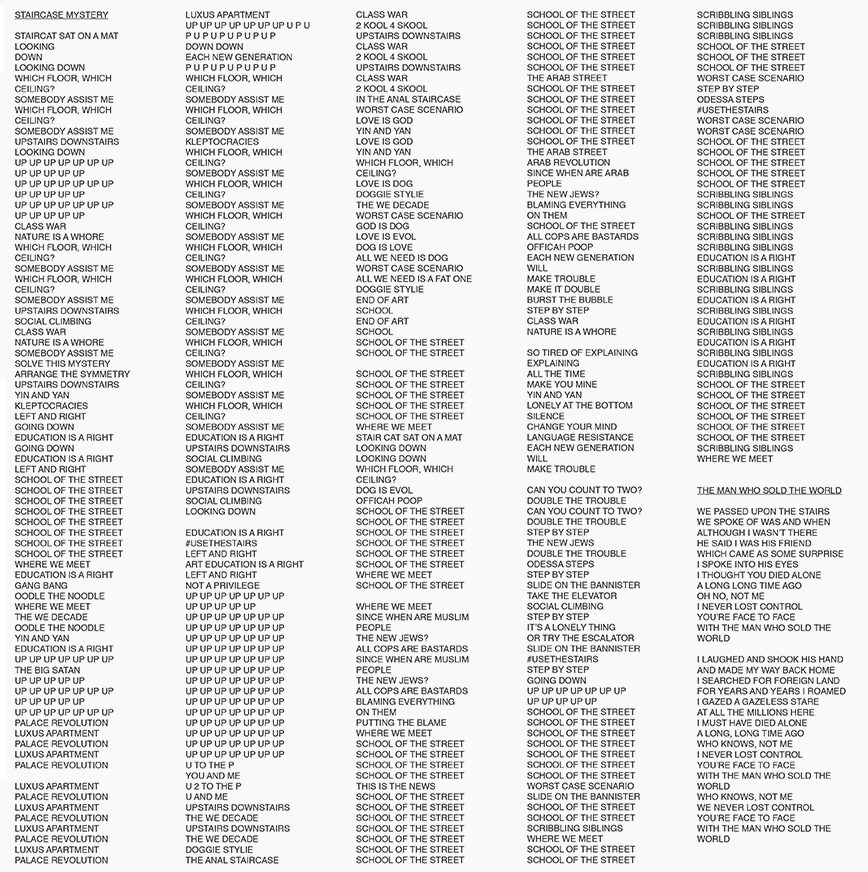
A Flower is Speaking to a dog
A set of generative texts following the genetic sequencing of DNA as the underlying structure or score for its characters.
Graphic design by Gerard Herman
Language: English

A set of generative texts following the genetic sequencing of DNA as the underlying structure or score for its characters.
Graphic design by Gerard Herman
Language: English

Contributors to Starship № 20:
Rosa Aiello, Terry Atkinson, Tenzing Barshee, Gerry Bibby, Mercedes Bunz, David Bussel, Jay Chung, Eric D. Clark, Caleb Considine, Hans-Christian Dany, Albert Dichy, Nikola Dietrich, Martin Ebner, Ruth Angel Edwards, Stephanie Fezer, Jean Genet, Simone Gilges, Julian Göthe, Michèle Graf, Selina Grüter, Ulrich Heinke, Toni Hildebrandt, Beatrice Hilke, Karl Holmqvist, Stephan Janitzky, G. Peter Jemison, Charlotte Johannesson, Julia Jost, Julia Jung, Jakob Kolding, Nina Könnemann, Lars Bang Larsen, Anita Leisz, Norman Lewis, Elisa R. Linn, Sebastian Lütgert, Vera Lutz, Chloée Maugile, Robert McKenzie, Ariane Müller, Christopher Müller, Robert M. Ochshorn, Henrik Olesen, Kari Rittenbach, Nina Rhode, Ulla Rossek, Cameron Rowland, Mark von Schlegell, Ryan Siegan Smith, Philipp Simon, Valerie Stahl Stromberg, Josef Strau, Vera Tollmann, Eleanor Ivory Weber, Camilla Wills, Amelie von Wulffen and Florian Zeyfang.
"This is the 20th issue of Starship and we are proud and very happy to present it, and mainly want to thank all the artists, the contributors, the columnists, and the people who helped us gather images of exhibitions past, and gave us texts from books not yet published. Starship never starts with a clear concept about its future content, or what could be called a theme, but always with a sort of attentive interest. The theme may develop through its columnists—we now think it is easy to distinguish lines of thoughts, images, and texts answering each other. But it surely does so out of this editorial interest that wanders, and finds, and collects, is enthusiastic about artworks, and texts, and people, and then, well, brings this all together in a magazine. This was our working mode during the past year, and the responsiveness of those who regularly write for Starship (the columnists) has shown us that out there others are involved in thoughts that run very much in parallel. It is a strange form, a magazine like this, not getting funded, appearing irregularly, but still following a sort of conventional form that shows its consistency. It is at its core an excess of producing something that might prove itself valuable and liberating in the future."
—Ariane Müller, Henrik Olesen

FORMS OF LIFE OF FORMS brings artistic research into form – not merely as an aesthetic question but as a social and political one. Indeed, there are no politics without form! With Forms of Life, Rob Ritzen curated several “Moments” that assembled works, collective readings, and other references into a single installation. This publication reshuffles documentation of these “Moments” as a visual reflection of the trajectory of this research.
Rob Ritzen works as a curator with a background in philosophy. His curatorial practice is focusing on self-organized and cooperative formats. Consciously positioned at the margins of established institutions and outside of market-oriented spaces, his practice is placed in close association with communities of cultural practitioners. His initiatives are attempts to reconfigure the politics of making art and alternative forms of production and presentation.

An oral performance (concept, texts and voice by Karl Holmqvist).
Newspaper articles, snippets of conversation and pop lyrics form a textual mesh and merge into a variety of forms in dealing with text and its decoding and recoding. The text sometimes allows the quoted sources to stand out clearly and at other moments concentrates on the original qualities of the language.
Karl Holmqvist reads his poems in his distinctive lilting monotone way. He unterstands reading poetry as a form of visual art: as a form of invisible visual art, or as a form of Everyman's visual art. He is interested in poetry as a vehicle for communicating with and between people.
Recorded at Centre d'Art Contemporain Genève and in Karl Holmqvist's studio in Berlin.
Karl Holmqvist (born 1960 in Västerås, lives and works in Berlin and Stockholm) is a Swedish artist and poet whose work explores language as a sculptural and performative medium. Known for his text-based pieces, readings, and installations, he reconfigures language into rhythmic, often hypnotic compositions that unfold across performance, print, video, and object-based formats. Drawing on pop culture, protest, and poetry, Holmqvist transforms everyday language into visual and sonic material—blurring the boundaries between reading, speaking, and listening. His distinctive voice and approach invite audiences to encounter language not just as communication, but as energy, structure, and presence.

the second poetry collection from Natalie Briggs titled ‘FLOWER ENGINE’. This collection of cinched, bright free-verse explores the passing locations of love and the slow, private operations of pain’s knocking counterweight. The book extends Briggs’ relay of concise universal suggestions, translating them through brief, intimate utility.

13 poems of various length.
"I have used a procedure to write them and I am happy to share it, but it isn't what's most important about these poems. The subject matter that, I eventually realised, they share to the extent of justifying bundling them up in one pamphlet is religiosity, what stands between belief and act, be it faith or trust."